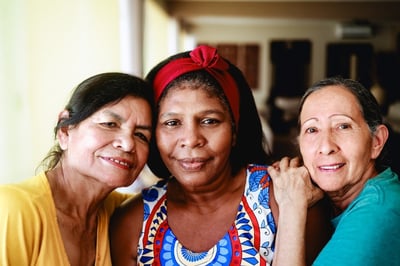Detrás de los titulares sobre el cáncer
Obtener más información sobre el programa de XRAY



Relevancia: Media-alta
Este artículo es de mayor interés para: Personas con cáncer de endometrio
Actualización: Noticias de la FDA: Nuevas aprobaciones para el cáncer de endometrio
Recientemente, la Administración de Alimentos y Medicamentos (FDA) aprobó tres nuevos tratamientos de inmunoterapia (Jemperli, Imfinzi y Keytruda) contra el cáncer de endometrio avanzado. (Publicado 11/7/24)
Leer más ›


Relevancia: Media
Este artículo es de mayor interés para: Personas que consideran someterse al proceso de conservación de la fertilidad
Estudio: Efectos del cáncer de mama y las mutaciones en el gen BRCA en la conservación de la fertilidad
Las conversaciones oportunas sobre planificación familiar son importantes para las personas diagnosticadas con cáncer de mama, al igual que para las personas que tienen una mutación hereditaria en los genes BRCA1 o BRCA2. Este estudio analizó la cantidad de óvulos maduros recolectados al momento de estimular los ovarios para la conservación de la fertilidad (proceso médico para guardar óvulos, espermatozoides o tejido reproductivo para que una persona pueda tener hijos en el futuro) o las pruebas genéticas preimplantacionales (análisis genéticos que se realizan en embriones antes de ser transferidos al útero para detectar alteraciones cromosómicas y genéticas) en los tres grupos de mujeres y se observó que la cantidad de óvulos recolectados fue similar. (Publicado el 31/10/24)
Leer más ›


Relevancia: Media-alta
Este artículo es de mayor interés para: Personas con cáncer de endometrio avanzado
Estudio: Manejo de los efectos secundarios del tratamiento contra el cáncer de endometrio
La inmunoterapia más la terapia dirigida es una opción de tratamiento contra el cáncer de endometrio avanzado que ha progresado después del tratamiento previo. Es más probable que las personas que inician el tratamiento con la combinación de dos medicamentos tengan una experiencia positiva si conocen cuáles son los posibles efectos secundarios y cuándo se pueden presentar. En esta publicación se habla de cuáles son los efectos secundarios más comunes y cómo manejarlos. (Publicado el 25/9/24)
Leer más ›


Relevancia: Alta
Este artículo es de mayor interés para: Personas cuyo cáncer de mama hizo metástasis en el cerebro
Estudio: La combinación de dos medicamentos anti-HER2 mejora los resultados en comparación con el tratamiento con uno solo
La combinación de dos medicamentos anti-HER2 aumentó el tiempo antes de que el cáncer reapareciera en personas con cáncer de mama HER2+ localmente avanzado o metastásico en comparación con personas que sólo recibieron un medicamento anti-HER2. Las personas cuyo cáncer de mama había hecho metástasis en el cerebro también se beneficiaron con el tratamiento de dos medicamentos combinados. (Publicado el 17/9/24)
Leer más ›


Relevancia: Media
Este artículo es de mayor interés para: Personas con cáncer de próstata
Actualización: Boletín de la FDA: tratamiento de primera línea y medicamentos biosimilares para tratar el cáncer de próstata
En fechas recientes, la Administración de Alimentos y Medicamentos (FDA, por sus siglas en inglés) aprobó un tratamiento de primera línea para el cáncer de próstata no metastásico sensible a la castración. De igual forma, la FDA aprobó dos medicamentos nuevos conocidos como biosimilares que se pueden utilizar en lugar de dos medicamentos que ya se aprobaron para prevenir el debilitamiento de los huesos, dolor o fracturas que se puedan presentar a causa de ciertas terapias hormonales o por cáncer que se haya diseminado a los huesos. (Publicado el 10/9/24)
Leer más ›


Relevancia: Media-alta
Este artículo es de mayor interés para: Personas con síndrome de Lynch y personas con cáncer colorrectal que pueden tener síndrome de Lynch
Estudio: El cáncer colorrectal en personas con síndrome de Lynch puede incluir los tipos de cáncer que se detectan con más frecuencia en personas sin síndrome de Lynch
Cuando las personas con síndrome de Lynch desarrollan cáncer, los tumores muchas veces tienen una serie de características llamadas biomarcadores (indicadores que ayudan a detectar problemas de salud en el cuerpo) conocidos como deficiencia de reparación de desajuste o dMMR e inestabilidad microsatelital alta o MSI-H. Sin embargo, a veces las personas con síndrome de Lynch tienen cánceres que presentan competencia en la reparación de errores de emparejamiento (pMMR o MMR-P) y estabilidad microsatelital (MSS o MSI-L). Estos cánceres son más similares a los cánceres colorrectales detectados en personas sin síndrome de Lynch. Este estudio demuestra que el 10 % de las personas con síndrome de Lynch pueden tener estos tipos de cánceres, factor que puede cambiar las recomendaciones de tratamiento. (Publicado el 5/9/2024)
Leer más ›


Relevancia: Media-alta
Este artículo es de mayor interés para: Personas con cáncer HER2+ avanzado
Tema: El medicamento Enhertu recibió la aprobación de la FDA para el tratamiento de cualquier tipo de tumores HER2+ avanzados o metastásicos
Enhertu recibió la aprobación acelerada de la FDA en personas con cualquier tipo de tumor HER2+ metastásico o que no se puede extirpar quirúrgicamente. Los pacientes elegibles deben haber recibido algún tratamiento anteriormente, como quimioterapia o tratamiento hormonal. (publicado el 19/7/24)
Leer más ›


Relevancia: Media-alta
Este artículo es de mayor interés para: Pacientes de cáncer
Tema: Los especialistas exhortan a la provisión de cuidados paliativos desde las etapas iniciales para pacientes de cáncer
Las personas con cáncer necesitan apoyo y cuidados no solo en la etapa final de la vida, sino desde su diagnóstico. En su congreso anual de 2024, la presidenta de la Sociedad Estadounidense de Oncología Clínica (ASCO, por sus siglas en inglés) instó a los profesionales de la salud a hacer de los cuidados paliativos un elemento central en el tratamiento del cáncer. (publicado el 17/7/2024)
Leer más ›


Relevancia: Media-alta
Este artículo es de mayor interés para: Personas con mutaciones en los genes BRCA1 o BRCA2 que estén considerando realizarse una resonancia magnética mamaria
Estudio: Las resonancias magnéticas mamarias anuales mejoran el pronóstico de las mujeres con mutaciones hereditarias en los genes BRCA.
Un estudio internacional sobre las resonancias magnéticas (RM) anuales realizadas en mujeres con mutaciones en los genes BRCA1 y BRCA2 encontró que las portadoras de mutaciones en el gen BRCA1 que se realizaron pruebas con RM presentaban menos probabilidades de morir a causa del cáncer de mama que aquellas que no se las realizaron. Es necesario realizar más estudios con otras portadoras de mutaciones en el gen BRCA2 para determinar si la realización de RM mamarias anuales puede reducir el número de muertes a causa del cáncer de mama en este grupo. (publicado el 24/6/24)
Leer más ›


Relevancia: Media-alta
Este artículo es de mayor interés para: Personas con cáncer de mama HER2+ en etapas iniciales
Actualización: La terapia dirigida para el tratamiento de cáncer de mama HER2+ en etapas iniciales continúa demostrando sus beneficios
Las personas con cáncer de mama HER2+ en etapas iniciales se pueden beneficiar de la terapia dirigida. Esta actualización incluye información nueva sobre la supervivencia y el tiempo sin resurgimiento del cáncer (publicado el 20/6/24)
Leer más ›